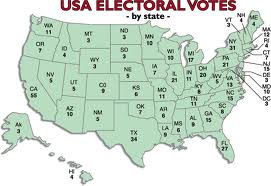Why should you vote for the President of the United States of America?
Most of you will never set foot into a city or county council meeting. In these forums, you generally have face to face access to policymakers that you directly elect. These men and women have a significant impact on essential aspects of your everyday life, particularly in areas like school funding, access to fire and rescue service, water and sewage policies, zoning, annexation, local tax rates, and so on. Yet, we hardly ever never rock the county or town council vote – indeed, in most cases, I bet county council debates hardly make it onto the radar compared to the hoopla surrounding the quadrennial presidential elections in the US.
The important point about these local elections cannot be stressed enough: i). You can go meet these policymakers and talk with them about issues of concern to you and your community and possibly persuade them on some matter; ii). They are directly elected by your vote and are therefore accountable to you and the coalition of voters of which you are a part.
In terms of the US president, however, the story is very different. The chances that you will ever meet the next US president (or any US president ever, for that matter) are slim to none – especially now with the intensified security practices surrounding the President following the events on 11 September 2001. Even when the fear of communist sabotage and the threat of Soviet nuclear weapons (which still exist, by the way) stalked Americans’ imagination during the Cold War, citizens were able to arrive early in the morning, wait in line outside the White House gate, and get an escorted tour of the public areas on most any day of the week. That type of open and symbolically more accessible attitude has evaporated over the past decade in regards to the President and the White House. In its place is an increasingly complicated, surveillance-intensive, and selective bureaucratic process that distances the office and the office holder from those that vote.
Even less likely are we, as average citizens living in Shepherdstown, WV, or any particular town across America, able to meet and meaningfully discuss, much less influence, the president on any issue of concern to you or your community.
On top of that, your vote, which millions of American citizens will cast in November, does not elect the president of the United States. To the surprise of many, no doubt, the US Constitution establishes an Electoral College [read here and here] with this authority. Who is the Electoral College? Robert Dahl, the distinguished professor of comparative democracy at Yale University, says that members of the Electoral College usually consist of a relatively unknown and partisan group of party loyalists.
The Electoral College, a fundamentally non-democratic and elitist feature of the US Constitution that insulates the president from the popular will, has created a dilemma for American politics that has played out on four different occasions in our history. Most recently, we saw the consequences of this Constitutional dilemma in the 2000 US election. In that instance, George W. Bush was elected to the highest office in the land because he won a majority of Electoral College votes; Al Gore won the majority of votes from American citizens, but lost the election. All in all, Dahl says that one out of every three US presidents has won with only a minority of voters’ support.
I want to bring the dilemma of our democracy home to you by asking you to reflect on your behavior.
Why should you vote for the American president? Or, if you think that you shouldn't vote for the US President, why shouldn't you vote? And, perhaps more importantly, why don’t you vote for the city and county council members? Do you know your council members?






















